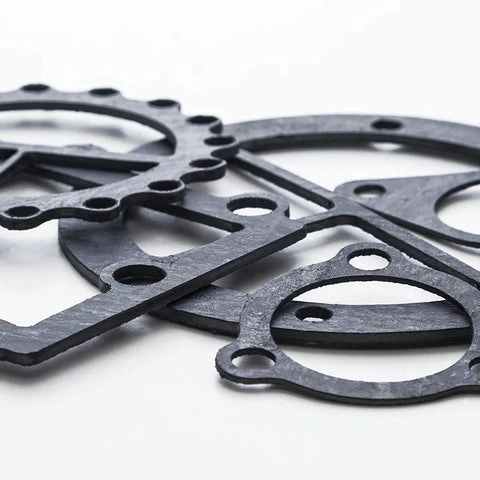· Excellent Chemical Resistance: Non-asbestos gaskets are known for their ability to withstand exposure to a wide range of chemicals. This feature ensures they maintain their integrity and sealing performance even in challenging industrial environments.
· Wide Temperature Range: These gaskets can handle extreme temperatures, making them suitable for both high-heat and low-temperature applications. From the scorching heat of an engine to the frigid conditions of a refrigeration unit, Non-asbestos gaskets have you covered.
· Resistance to Stress: Non-asbestos gaskets are designed to endure mechanical stress, ensuring they maintain their shape and sealing capabilities under pressure. This stress resistance is crucial in high-pressure systems like steam applications.
· High Joint Stability: When used in various applications, Non-asbestos gaskets maintain joint stability, preventing leaks and ensuring the integrity of the system.
· Outstanding Sealing Integrity: The primary purpose of a gasket is to provide a reliable seal. Non-asbestos gaskets excel in this aspect, ensuring that fluids, gases, or other substances remain contained within the system.
· Long Lifespan: Non-asbestos gaskets are built to last, offering a prolonged lifespan compared to many other sealing options. This durability translates to cost savings for businesses over time.

Non-asbestos gaskets are typically composed of two main components:
Fibrous Material: The fibrous material used in these gaskets is often aramid, commonly known as Kevlar. Aramid is a natural material that possesses remarkable heat resistance and strength. It can be up to five times stronger than steel and twice as strong as glass fibre or nylon. Additionally, aramid fibres are resistant to absorption and organic solvents, making them ideal for various industrial applications.
Binder Material: Elastomers like nitrile, neoprene, or EPDM rubber serve as the binder material in Non-asbestos gaskets. Each elastomer offers specific advantages. For instance, aramid fibres with a nitrile binder are well-suited for applications in water and wastewater treatment, oil and gas production, food processing, pipe flange gaskets, and boiler gaskets.
Non-asbestos gaskets find their use in a wide range of industrial settings, including:
Air Compressors: These gaskets help maintain airtight seals in air compressor systems.
Diesel Engines: In the automotive industry, Non-asbestos gaskets ensure efficient sealing in diesel engines.
Pipelines: They play a crucial role in sealing pipeline connections, and preventing leaks in oil and gas transportation.
Marine Applications: From ship engines to offshore installations, Non-asbestos gaskets are essential for marine industries.
Power and Utility: Power plants rely on these gaskets to maintain the integrity of their systems.
HVAC Systems: Heating, ventilation, and air conditioning systems benefit from Non-asbestos gaskets to ensure airtight seals.
Material Handling: In material handling equipment, these gaskets keep fluids and gases contained.
In conclusion, Non-asbestos gaskets have proven to be a safer, stronger, and more reliable alternative to asbestos gaskets. Their excellent chemical resistance, wide temperature range, and durability make them a preferred choice in various industrial applications. Whether in engines, pipelines, or HVAC systems, Non-asbestos gaskets play a vital role in maintaining system integrity and preventing leaks. With their trusted performance and adherence to industry standards, Non-asbestos gaskets continue to provide sealing solutions for a wide range of industries.
Contact us at gasket@weitengroup.com or visit our website www.weitengroup.com to explore our range of Non-asbestos gaskets.